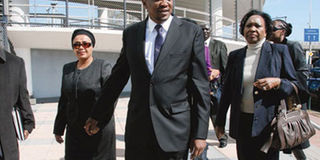Why Kenya case has been a headache for Hague court

Uhuru Kenyatta arrives at the International Criminal Court at The Hague. The approval, by the National Assembly, of a motion calling upon Kenya to withdraw from the ICC suggests that the country is now giving serious consideration to the possibility of non-cooperation in the Kenyan cases. PHOTO/FILE
What you need to know:
- In one interview, the prosecutor said it is difficult to find the persons responsible for the acts of intimidation since they act discretely.
- Mr Phakiso Mochochoko, who heads the jurisdiction, complementarity and cooperation division in the Office of The Prosecutor, told a panel discussion at Strathmore University on September 4 that the prosecution is concerned about the level of intimidation of victims and witnesses.
Concern over witness tampering and cooperation by the Kenya government are once again becoming a major headache for the ICC prosecution days before the opening of the trials of Deputy President William Ruto and Joshua Sang at The Hague.
On Thursday, Parliament passed a motion paving the way for the introduction of a government Bill to withdraw Kenya from the Rome Statute.
And now ICC Prosecutor Fatou Bensouda has warned individuals and groups that tamper with witnesses of stern action.
DELAY DISCLOSURE
Concern over the security of the witnesses, Ms Bensouda said, has been the reason the office of the prosecutor has often approached the Trial Chamber to delay disclosure of their identity.
“Security and safety of witnesses is our priority, and this explains our request to the Chamber to delay disclosure until the witness protection unit has taken adequate measures to protect the witnesses, including removing them from Kenya,” she said in ICC in Focus which aired on a local TV station.
The prosecutor, the defence teams and the victims’ lawyer have been holding interviews at The Hague. These interviews have been running on Citizen TV for the past week as the ICC seeks to inform Kenyans how the court works.
In one interview, the prosecutor said it is difficult to find the persons responsible for the acts of intimidation since they act discretely.
“Those who tamper with witnesses are very discreet and go to great lengths to hide their identities. We are monitoring the situation closely and continuing to gather as much information as possible related to our witnesses and the pressures our witnesses are encountering. We will take action based on evidence,” Ms Bensouda said.
The prosecution has in the past raised the red flag over harassment and intimidation by the suspects or their associates, which Ms Bensouda said “have continued unabated as the trial date draws closer.”
The trials of Mr Ruto and Mr Sang over their alleged role as key perpetrators in the post-election violence begin on Tuesday. President Uhuru Kenyatta will stand trial for crimes against humanity allegedly committed during the 2007/08 post-election violence beginning November 12.
According to the prosecutor, the suspects and their associates have gone to great lengths to persuade witnesses to recant their testimonies, including using bribery or outright threats and intimidation.
“Many of these witnesses have gone to great lengths to risk their lives and the lives of their relatives to support our investigations and prosecutions. These are people of immense moral courage who want see justice done in Kenya,” the prosecutor said.
“Relatives of witnesses have been approached to disclose the whereabouts of witnesses or those perceived to be our witnesses. Incentives, including bribes, have been offered and in some cases threats and intimidation have been used to solicit information about our witnesses,” she said.
Mr Phakiso Mochochoko, who heads the jurisdiction, complementarity and cooperation division in the Office of The Prosecutor, told a panel discussion at Strathmore University on September 4 that the prosecution is concerned about the level of intimidation of victims and witnesses.
“We are dealing with individuals in power which makes cooperation difficult. Witnesses willing to testify are afraid of testifying against their leaders,” he said. But he said the government is not collectively to blame for the acts of intimidation.
The common legal representative for the victims, Wilfred Nderitu, has not been spared either. According to Mr Nderitu, the threats even come sometimes from his colleagues in the legal profession.
“There are threats to witnesses coming from our midst. Personally, I am intimidated by my own friends who think that what I am doing is not noble,” said Mr Nderitu during the panel discussion on the theme, “Can the ICC work for Kenya if Kenya does not want to work with the ICC?”
The forum was organised by the Institute of War and Peace Reportof ing in collaboration with Wayamo Communications and Reporting Kenya.
At one point, Mr Nderitu said 93 victims wrote to him saying they did not wish to continue being part of the cases.
On the subject of cooperation, Mr Mochochoko said the government has failed to live up to its obligations as a state party to the Rome Statute that established the ICC.




